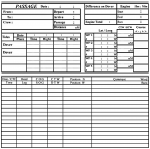Madryn
New Member
Thanks for that. It looks like a well laid out form.https://www.endeavour-sailing.co.uk/images/pdf/passage-plan-template.pdf
Try this. There are probably others available via charter company's or RYA.
It might be more than you need but makes you ask the right questions.


